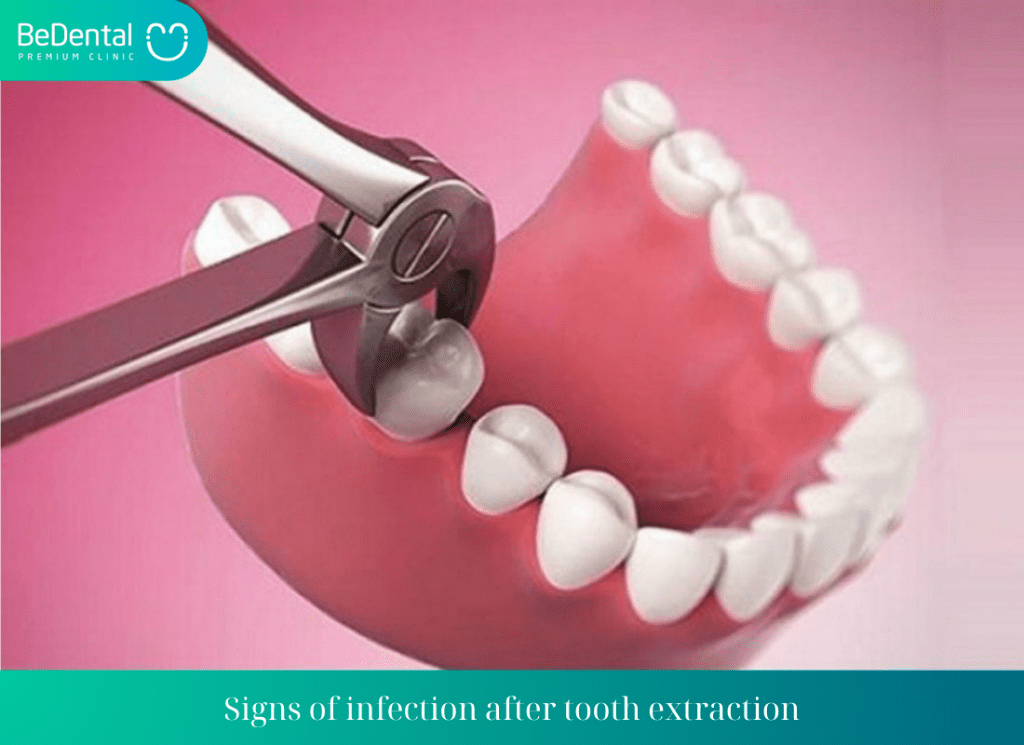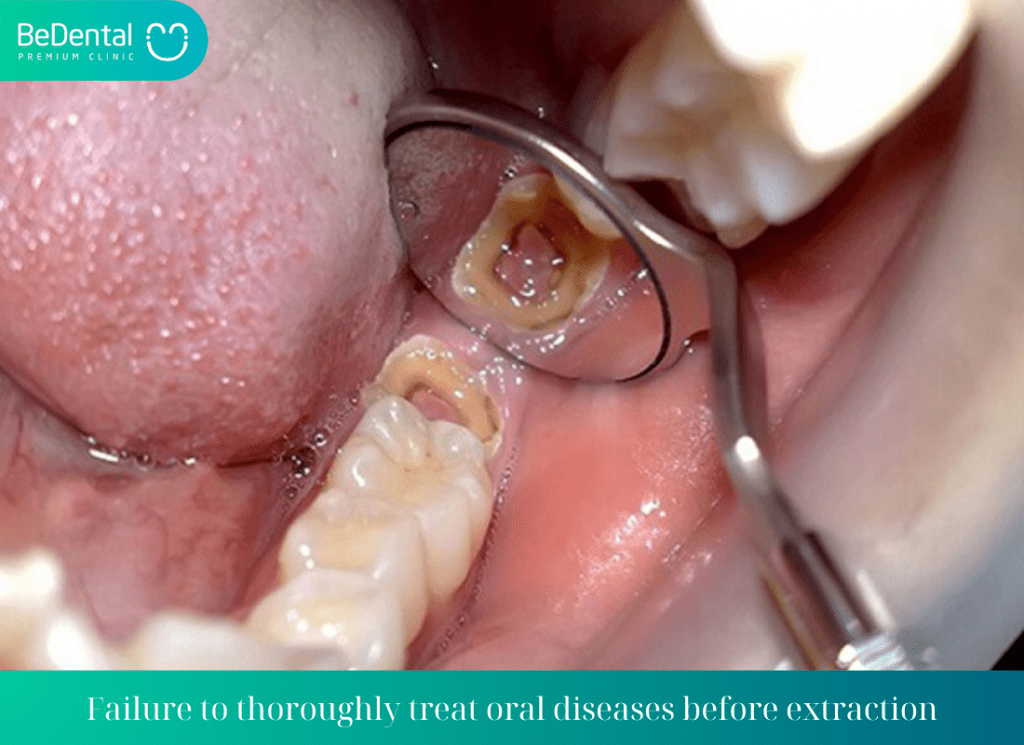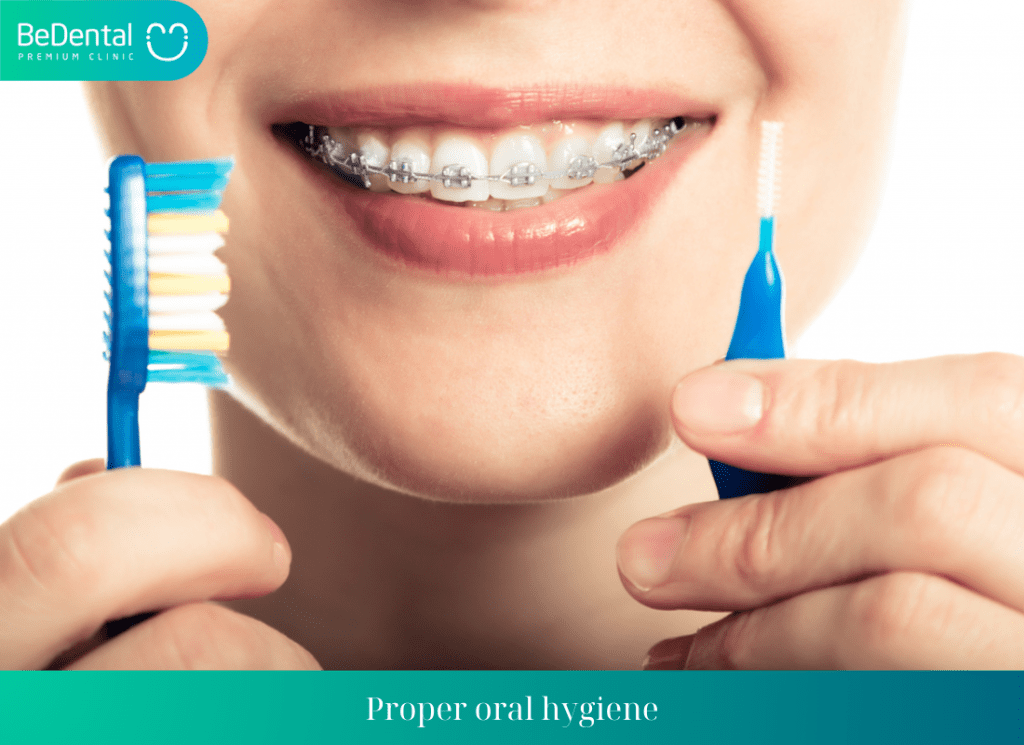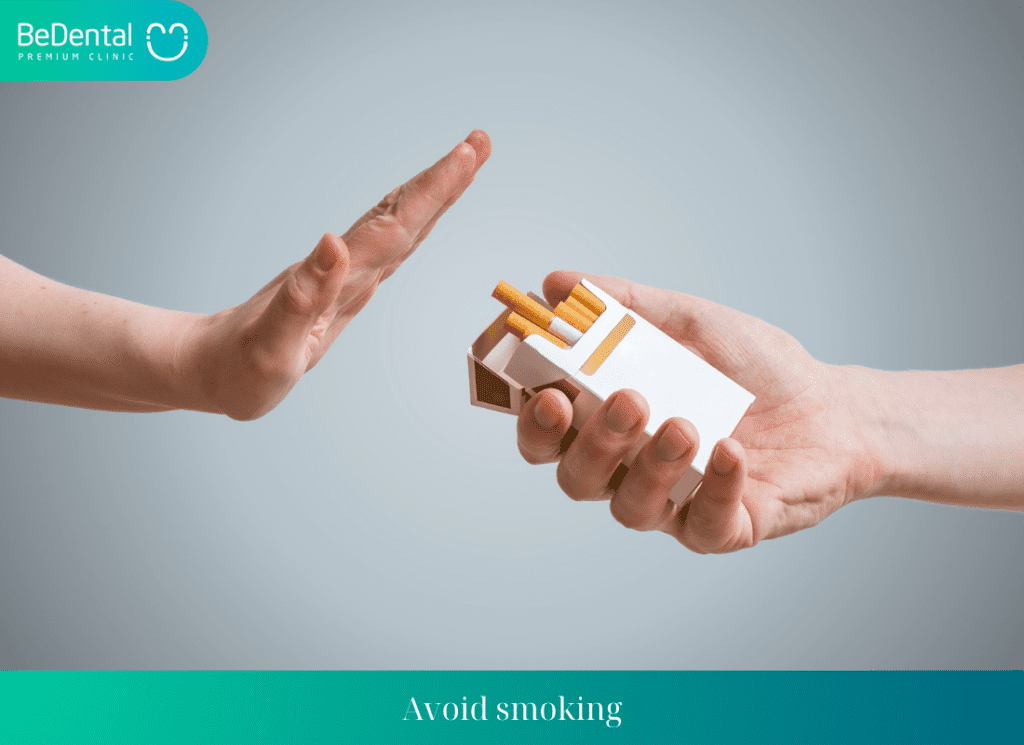Tooth extraction often causes a lot of pain and discomfort, and can be dangerous to health if an infection occurs. What are the signs of infection after tooth extraction? How to handle this situation? Let’s consult with the dental clinic Bedental below this article!
Signs of infection after tooth extraction
Typically, tooth extraction should be performed after examination and recommendation by a specialist to ensure safety. In cases such as impacted or partially erupted wisdom teeth, the process becomes more complex and requires higher technical expertise and treatment conditions.
See more: Can a broken denture be repaired?
There are some signs of infection after tooth extraction that need attention, which we will outline below:
- Swollen and persistent pain in the area.
- Throbbing pain in the jawbone or neck area, swollen gums and cheeks.
- Formation of pus accompanied by bleeding around the tooth.
- Increased sensitivity of the tooth to hot or cold foods.
- Changes in the color of the tooth.
- Feeling feverish.
- Swollen lymph nodes in the neck area.
- Prolonged bleeding for over 48 hours.
- Unusual breath odor, even after brushing teeth.

Although the tooth extraction process often causes discomfort such as pain and swelling due to the impact on the gums and jawbone, if these symptoms persist and show no signs of improvement, along with fever, difficulty breathing, and swallowing, it is a sign of a severe infection. In this case, the patient should immediately seek medical attention for examination and timely treatment to avoid potential dangerous complications.
Causes of infection after tooth extraction
What are the causes of infection after tooth extraction? Infection after tooth extraction is a condition where the tooth socket or surrounding structures such as the jawbone and gums are excessively damaged and infected, leading to inflammation or even necrosis.
Specifically, the causes of infection after tooth extraction include:
- Deeply embedded teeth requiring extensive gum incisions: Making extensive gum incisions provides an opportunity for bacteria to enter the wound and cause infection.
- Improper tooth extraction technique: Incorrect tooth extraction by a dentist can lead to compression and damage to the jawbone and surrounding areas, resulting in surgical site infection.
- Inadequate sterilization of tooth extraction instruments: Improperly sterilized tooth extraction instruments can increase the risk of infection after tooth extraction.
- Failure to thoroughly treat oral diseases before extraction: If patients do not effectively treat conditions such as cavities or pulpitis before tooth extraction, there is an increased risk of serious infection.
- Improper oral hygiene: If patients do not properly maintain oral hygiene and do not follow their dentist’s instructions, food particles can accumulate around the extraction site, creating conditions for infection to occur

What to do if a tooth extraction becomes infected?
What to do if a tooth extraction becomes infected? Here are some ways that the dental clinic Bedental recommends that you can apply:
Apply cold compress to reduce pain
Applying a cold compress is a useful method to reduce pain and alleviate infection after a tooth extraction. This method helps constrict blood vessels, reduce blood flow, and alleviate pain caused by inflammation.
See more: What is tooth filling?
Gently rinse with salt water
Using salt water to rinse your mouth is a gentle but effective method. Salt water helps eliminate bacteria in the mouth and clean the area around the extracted tooth.
You can mix salt water with about 250ml of warm water and use it to rinse your mouth gently about 2 times a day to maintain oral health after wisdom tooth extraction.
Proper oral hygiene
To protect your oral health after tooth extraction, proper oral hygiene is essential. In addition to using salt water for rinsing, you should also brush your teeth at least twice a day following your dentist’s instructions.

Additionally, you can also use dental floss to remove any remaining food particles, helping to prevent bacteria from entering the mouth and the wound after tooth extraction.
Healthy diet
To address infection after wisdom tooth extraction, you can adjust your diet by favoring soft, liquid, and easy-to-swallow foods such as porridge, soup, and milk.
Avoid eating foods that are too hard or tough to prevent affecting the wound from the tooth extraction. Additionally, in the first week after tooth extraction, limit consumption of spicy, extremely hot or cold, sour, or salty foods, as well as reduce alcohol and beer intake.
Visit a reputable dental clinic for examination and treatment
To prevent the spread of infection in the mouth, we advise you to visit a dentist as soon as you experience symptoms.
See more: How much does filling a cavity cost?
The dentist will examine the oral condition and determine the cause of the issue. Based on that, the dentist will propose appropriate treatment methods to eliminate the infection and maintain dental health effectively.
Preventing infection after tooth extraction
After tooth extraction, preventing infection is crucial to ensure the healing of the wound and prevent other health issues.
To prevent infection after wisdom tooth extraction, here are some measures you can take to keep the gum and tooth area clean and prevent infection:
- Follow the dentist’s instructions: Follow specific guidelines from the dentist on post-tooth extraction care, including cleaning and caring for the gum and tooth area.
- Gum care: Use a saline solution or diluted salt water to rinse your mouth daily, especially after eating. This can help clean the wound area and reduce bacteria.
- Avoid smoking: Smoking can lead to serious issues after tooth extraction, including slowing the healing process and increasing the risk of infection.

- Avoid touching the extraction site: Avoid touching or poking the extraction site with your fingers or other objects. This helps prevent bacteria from hands or objects from entering the wound.
- Maintain oral hygiene: Gently brush your teeth twice a day with a soft toothbrush and fluoride toothpaste. Avoid brushing too hard near the extraction site to prevent injuring the wound.
- Monitor symptoms: Monitor any signs of infection such as pain, swelling, or bleeding from the extraction site. If you notice any signs of infection, contact your dentist immediately.
Remember that post-tooth extraction care is important to ensure a smooth healing process and prevent potential health issues. If you have any questions or concerns, discuss them with your dentist.
See more: What are the cost of braces?
Not only taking care of oral hygiene and eating properly, but the most important thing is to choose a reputable wisdom tooth extraction facility such as Bedental clinic.
We often have a team of professional dentists with skills and experience, performing the tooth extraction process quickly and gently. Additionally, using modern medical equipment helps reduce the risk of infection after tooth extraction and potential complications.
Most asked questions
How long does it take for the extraction site to heal completely?
The time it takes for the extraction site to heal completely can vary depending on the individual and the complexity of the extraction. In general, it can take anywhere from a few days to a few weeks for the extraction site to fully heal.
During this time, it is important to follow your dentist’s post-extraction care instructions, maintain good oral hygiene, and watch for any signs of infection or complications.
If you have any concerns about the healing process or if you experience prolonged pain, swelling, or other unusual symptoms, it is best to consult with your dentist for further evaluation and guidance.
Can I brush my teeth normally after a tooth extraction, or should I follow a different oral hygiene routine?
After a tooth extraction, it is important to practice good oral hygiene to promote healing and prevent infection. However, you should follow a modified oral hygiene routine to protect the extraction site. Here are some tips:
- Wait to Brush: Avoid brushing the extraction site for the first 24 hours after the procedure to allow the blood clot to form and protect the wound.
- Gentle Brushing: After the first 24 hours, you can resume brushing your teeth, but be very gentle around the extraction site. Use a soft-bristled toothbrush and avoid brushing directly on the extraction site to prevent dislodging the blood clot.
- Rinse with Salt Water: Rinse your mouth with warm salt water (1/2 teaspoon of salt in a cup of warm water) multiple times a day, especially after meals, to keep the area clean and promote healing.
- Avoid Mouthwash: Avoid using mouthwash that contains alcohol, as it can irritate the extraction site.
- Follow Dentist’s Instructions: Your dentist may provide specific instructions on how to care for the extraction site. Follow these guidelines carefully to ensure proper healing.
If you have any concerns or questions about your oral hygiene routine after a tooth extraction, don’t hesitate to contact your dentist for personalized advice.
Conclusion
In conclusion, proper care after tooth extraction is essential to prevent infection and ensure a smooth healing process. Following the dentist’s instructions, maintaining oral hygiene, and monitoring for any signs of infection are key steps in post-extraction care.
Choosing a reputable dental clinic with skilled professionals and modern equipment, like Bedental, can further decrease the risk of complications and promote optimal recovery after wisdom tooth extraction. Remember, prioritizing oral health and seeking prompt dental care are crucial for overall well-being.
Tư vấn chuyên môn bài viết:
BÁC SĨ DƯƠNG THỊ THÙY NGA





